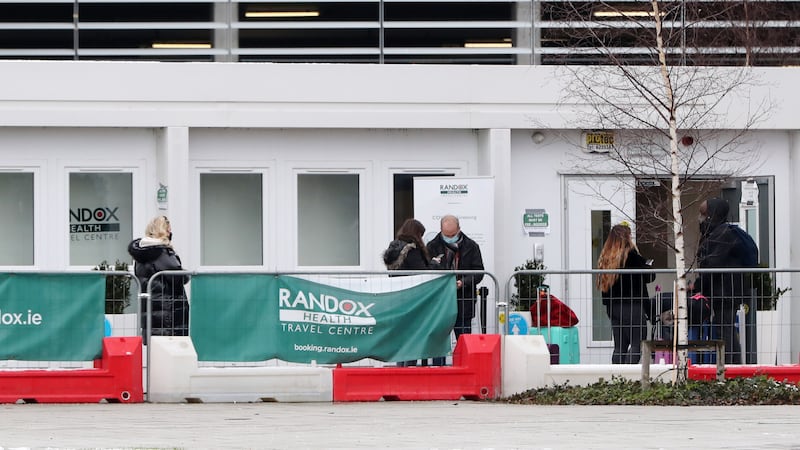Level Five lockdown measures will continue until at least early March, under proposals to go before the Irish Cabinet on Tuesday.
A Cabinet sub-committee met on Monday night to consider a range of new measures to combat the pandemic, including extending lockdown until March 5th – in line with Northern Ireland.
Mandatory quarantine of 14-days will be enforced for international travellers who arrive in the country without a negative PCR test taken in the previous 72-hours.
Passengers from Brazil and South Africa, where new variants of Covid-19 have emerged, will also be subject to quarantine, according to Government sources.
A full meeting of the Cabinet is to take place on Tuesday where the proposals are expected to be signed off on.
It comes as the Republic's Deputy Chief Medical Officer warned the full reopening of schools is unlikely to happen in the coming weeks as transmission of Covid-19 in the community remains too high.
The daily case tallies have dropped significantly in recent weeks due to lockdown measures, with 1,372 cases reported on Monday, compared to a high of 8,248 cases on January 8.
But while case numbers are dropping and the numbers of people in hospitals and intensive care units is beginning to plateau, it still to early to consider reopening schools, Dr Ronan Glynn said.
He told a briefing on Monday evening: “It’s a very significant improvement over the past couple of weeks and where we were.
“But we’re still at a level of disease that is way, way higher than where we want to be, or need to be in general terms.
“All I can say is that, from our perspective, right now is not the time to see mobility of over a million people that would be associated with the full reopening of education.
“In the first instance we need to be assured that the improvements that we’ve seen in the disease numbers, in the trajectory, is continuing. And that we don’t now plateau at where we are. We need to see a continued improvement.”
He added: “I can’t see it happening in the next fortnight for sure.”
A Cabinet sub-committee is meeting on Monday evening to discuss current restrictions – including the implementation of stricter quarantine rules for international travellers.
“Any measure that reduces passengers coming into this country for non-essential purposes we welcome,” Dr Glynn said.
Dr Glynn said there are “positive signs”, with the number of hospital admissions per day decreasing for the last two weeks.
He said: “It peaked at around 140 admissions per day, on average, it’s below 100 over the last seven days, and we saw 74 admissions or confirmations today. The number in ICU plateauing at over 200.”
However, he said the National Public Health Emergency Team (Nphet) expects those numbers “to remain very high for weeks to come”.
He said: “Despite all of the hard work that we’re doing, it is going to take a long time for numbers in hospital to reduce.
“We do expect to see numbers in hospital at or above 1000, even out to the end of February.
“In terms of numbers of people in critical care, we expect to see that start to reduce over the coming week. But again, likely to remain above 100, well out to the end of February.
“I’m saying that so that people prepare for that or not disheartened by the fact that it is going to take a long time to bring the burden on our healthcare system back down to reasonable levels.”
Dr Glynn said the number of close contacts reported by confirmed cases has dropped and is remaining low.
He said: “That indicator, the number of close contacts per case has been below 2.5 since the beginning of January.
“People are maintaining that effort and the numbers of contacts remains low.
“That’s a little bit different from what we saw in October, where numbers of contacts came down to a low level and then immediately began to drift back up.
“Here the context came down to a low level, and are remaining low. And that’s something that we need to feed back to people.
“We can clearly see the efforts that they’re making to stay apart, to prevent transmission of the virus.”
There were seven additional deaths linked to Covid-19 on Monday, and an additional 1,372 cases.
The number of people in intensive care units has increased by one, to 219, according to the latest figures.
Meanwhile, community vaccinations in the Republic of Ireland will begin as planned next month despite disruptions to the delivery of the AstraZeneca vaccine, the Health Minister said.
Stephen Donnelly said on Monday that Ireland will receive a delivery within the expected range of doses for February, “although at the lower end of that range”.
Non-healthcare workers over the age of 70 will begin in the middle of February as planned, he said.
However, vaccine delivery in March is anticipated to be more severely impacted and “considerably lower” that what was initially stated by the company.
It came as the European Commission demanded an explanation from AstraZeneca over the disruption to its vaccine delivery.








